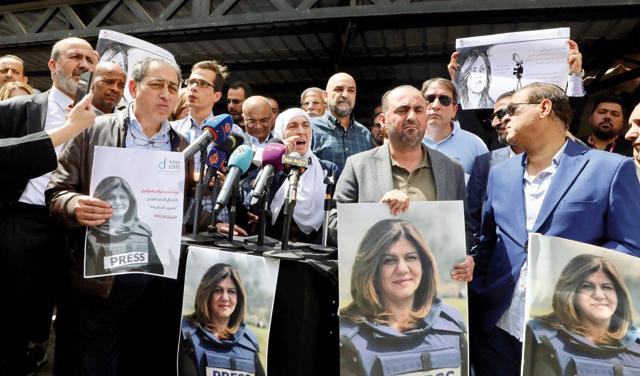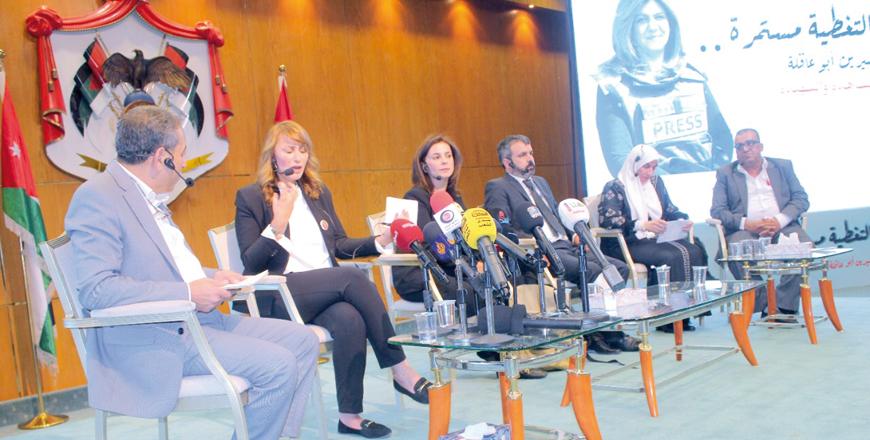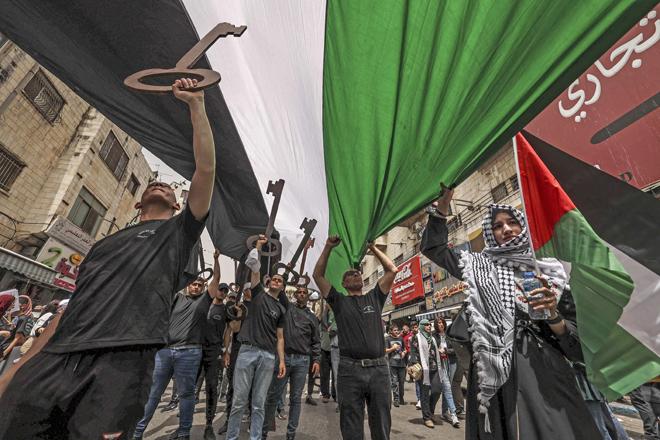You are here
Jordanian journalists, activists deplore killing of veteran Palestinian journalist Shireen Abu Akleh
By Maria Weldali - May 12,2022 - Last updated at May 12,2022

Journalists and activists gather in front of Al Jazeera’s headquarters in Amman to protest the killing of the channel's veteran reporter Shireen Abu Akleh in the occupied West Bank town on Wednesday (Photo by Osama Aqarbeh)
AMMAN — Journalists and activists in Jordan on Wednesday gathered in front of Al Jazeera’s headquarters in Amman to protest the killing of veteran Al Jazeera reporter Shireen Abu Akleh in the occupied West Bank town of Jenin earlier in the day.
Meanwhile, an atmosphere of sorrow, shock and outrage has filled social media networks and news outlets over the loss of Abu Akleh.
Minister of State for Media Affairs Faisal Shboul condemned the “cold-blooded assassination” of Abu Akleh. Shboul stressed that this crime constitutes “a flagrant breach of International Humanitarian Law and the international conventions”.
Jordan Press Association (JPA) Spokesperson Ali Freihat on Wednesday told The Jordan Times that what happened to Abu Akleh was “intentional and part of the Israeli occupation’s systematic silencing of press and media personnel”.
The JPA is following up the situation and is communicating with the Palestinian Journalists Syndicate, according to Freihat, who said that the Israeli occupation bans journalists from covering Israeli discriminatory policies and the suffering of Palestinians.
Freihat also said that Israel is “the enemy of truth, press freedom and humanity”.
Abu Akleh was shot on Wednesday morning while reporting on the Israeli raids and brutality unfolding in the occupied West Bank city of Jenin. She was declared dead shortly afterwards, according to the Palestinian health ministry. She was wearing a press vest, a clearly defined attire.
An Al Jazeera journalist, Ali Samoudi, who was also wounded with a bullet in the back, said to Al Jazeera network: “The first bullet hit me and the second bullet hit Shireen … there was no Palestinian military resistance at all at the scene.”
Following the announcement of Abu Akleh’s death, leaders, activists, journalists and social media users have been actively commenting on social media networks. Secretary General of the Jordanian National Commission for Women Salma Nims, wrote on her Twitter account: “How can the world continue to sit and watch Israeli terrorism silently?”
“The assassination of the Palestinian journalist is another witness of the Israeli occupation’s atrocity, which has been ongoing for the last 74 years, and by doing so they are trying to silence eyewitnesses who uncover their crimes to the world,” tweeted Director of the Phenix Centre for Economic Studies Ahmad Awad.
Abu Akleh’s assassination crime “cannot be treated in the usual way, by cursing and condemning Israeli settlers, then getting on with life”, Hala Ahed, a Jordanian advocate and human rights defender said on her Twitter account.
Also on Twitter, Palestinian-American speaker and journalist Samar Jarrah wrote: “This is paid for by Western democratic countries who continue to support a settler colonial racist project in Palestine. Her blood is on your hands.”
Further, Palestinian politician and activist Hanan Ashrawi, tweeted that the late Al Jazeera reporter was, “a wonderful human being, a remarkable journalist and a dear longtime friend,” adding that Palestine is grieving her loss.
Additionally, Jordanian journalist Musab Shawabkeh wrote on Twitter that the Israeli occupation “does not know rights, nor does it know or respect freedom”.
Jordanian TV host Rahaf Sawalha wrote on her Instagram page that killing Abu Akleh is “an assassination to the free voice of Palestine”, pointing out that what happened is a breach of all laws and norms.
“Unfortunately, a word of truth comes at a cost and the voice of right is always fought,” she concluded.
The usual sentence Abu Akleh used to say every morning on screen was that she “will bring her news as soon as the picture becomes clear”, Jordanian activist Dehma Hajaya said on her Twitter account, adding, “and now is the picture clear for the whole world”.
In a video, which became viral on all platforms, Abu Akleh is seen giving her reason for being a journalist, stating: “I chose journalism to be close to people. It might not be easy to change the reality, but at least I could bring their voices to the world.”
Related Articles
AMMAN — Western media outlets’ reluctance to name Israel as the perpetrator of Al Jazeera’s Palestinian reporter Shireen Abu Akleh’s assassi
AMMAN — “People have always been the story, that is what Shireen taught us,” said Al Jazeera reporter Givara Budeiri on Tuesday.Budeiri’s re
OCCUPIED JERUSALEM — Palestinians rallied Sunday to mark the "Nakbeh," or catastrophe, 74 years after Israel's creation, with condemnation s













